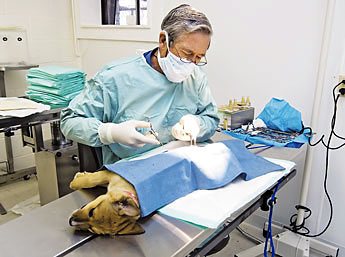|
Humane Society offers neuter, spay clinics

Dr. Clinton Balok spays a dog Wednesday morning at the Gallup McKinley
County Humane Society during their weekly discounted Spay-Neuter
Clinic. In 2006 the society handled 4,670 animals, of which 3,066
were destroyed. The purpose of the clinic is to reduce the number
of unwanted pets. According to Cosy Balok, one single dog that breeds
can produce 67,000 descendents. [Photo by Jeff Jones/Independent]
By Natasha Kaye Johnson
Diné Bureau
GALLUP — They're supposed to be man's best friend
and companion, but dog owners aren't keeping up their end of the
deal.
Last year alone, the Gallup-McKinley County Humane Society sheltered
4,690 animals that were either picked up or given to the shelter
by the owners. A little less than a third were adopted or reclaimed,
while 3,066 cats and dogs were put to sleep.
"We've been doing this for 18 years, and the figures haven't
gone down a lot," said Cosy Balok, Director for the Humane
Society.
At least two times a week, the society injects between 60-100 puppies,
dogs, and cats with a solution that stops their hearts, and kills
them within minutes. The animals are then transported to Thoreau
where they are disposed of in a special landfill.
After years of trying to educate people about the benefits of spading
or neutering their animals, the Humane Society has decided to break
down and offer spading and neutering clinics.
While the average cost of fees for spading and neutering ranges
between $80 to $120, the Society is asking for only $35. Every Wednesday,
the Humane Society will have the discounted clinic open to low-income
households, hopeful that people will come in to take advantage of
the service.
According to the National Humane Society, one female dog and her
offspring can breed 67,000 puppies in six years.
Earlier this week, Balok said a woman dropped off ten puppies from
her female pitbull dog. The lady kept the dog, but told them that
she didn't want the puppies.
"Killing animals is not the solution," said Balok.
Instead of seeing a simple solution of spading or neutering their
pets, Balok said some people just drop off the puppies that they
don't want. With the low fee in place, Balok said there is no reason
for people to be doing that.
"It's a one time thing, its a one-time cost," she said.
"Raising a litter of puppies costs a whole lot more."
The discounted clinic began last April, but with the spring just
around the corner, staff are encouraging people to bring in their
pets now, especially since the spring and summer time is when they
are "in heat."
Often, Balok said, long-time owners come in to drop off their pets.
It still comes as a shock to Balok and the staff.
"Some people just give their animal up because they're tired
of it," said Balok. "(But) they're not disposable. It's
our responsibility to take care of them properly."
"These are companion animals, and they need to be treated as
such," she added.
The illegal breeding of dogs is another problem that the society
has had to begin tackling.
In the city, there is a law that prohibits people from breeding
dogs without a permit. Though the law was passed some time ago,
the Humane Society was loose about enforcing it. But because of
the high number of animals they put to sleep each week, they are
making conscious efforts to enforce the law. The society is paying
close attention to ads in the newspaper that advertise for breeding
of animals, as well as keeping an eye on homes that have large numbers
of dogs and cats.
"They're just adding to the problem of us euthanizing the animals,"
said Balok.
The breeding law requires that owners purchase a permit at $35,
and that they have the facilities to properly house and maintain
animals.
Balok is asking that people spread the word about the epidemic,
and pet overpopulation.
But its just not a problem single to Gallup and McKinley County.
"The problem is throughout the world," said Balok, adding
that nearly 3-4 million animals are euthanized each year in the
United States.
Because of poor animal control policies in the surrounding reservations,
the society has to double their efforts on control. Last year, the
society removed 376 dogs from the roads within the city limits,
and on the outside county roads.
"That's where our situation is unique," said Balok.
And though Balok has been working with animals for nearly 20 years,
the process of putting animals to sleep hasn't got easier.
"It never gets easier, it gets harder," said Balok. "It's
hard to euthazine a dog when they crawl up into your arms and lick
your face."
"In a way, I wish everyone could witness euthanizing, so they
could see what a difficult task it is," said Balok.
For more information, call the Humane Society at 505-863-0325.
|
Thursday
January 11, 2007
Selected
Stories:
Navajo
woman vies for mayor
Navajo
Utah Commission tries to help radiation victims
Halt! You're
under arrest!; Grants Police wheel to the rescue on Segways
Humane
Society offers neuter, spay clinics
Deaths
|



